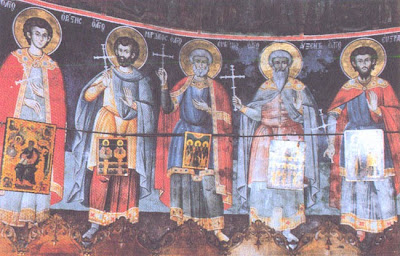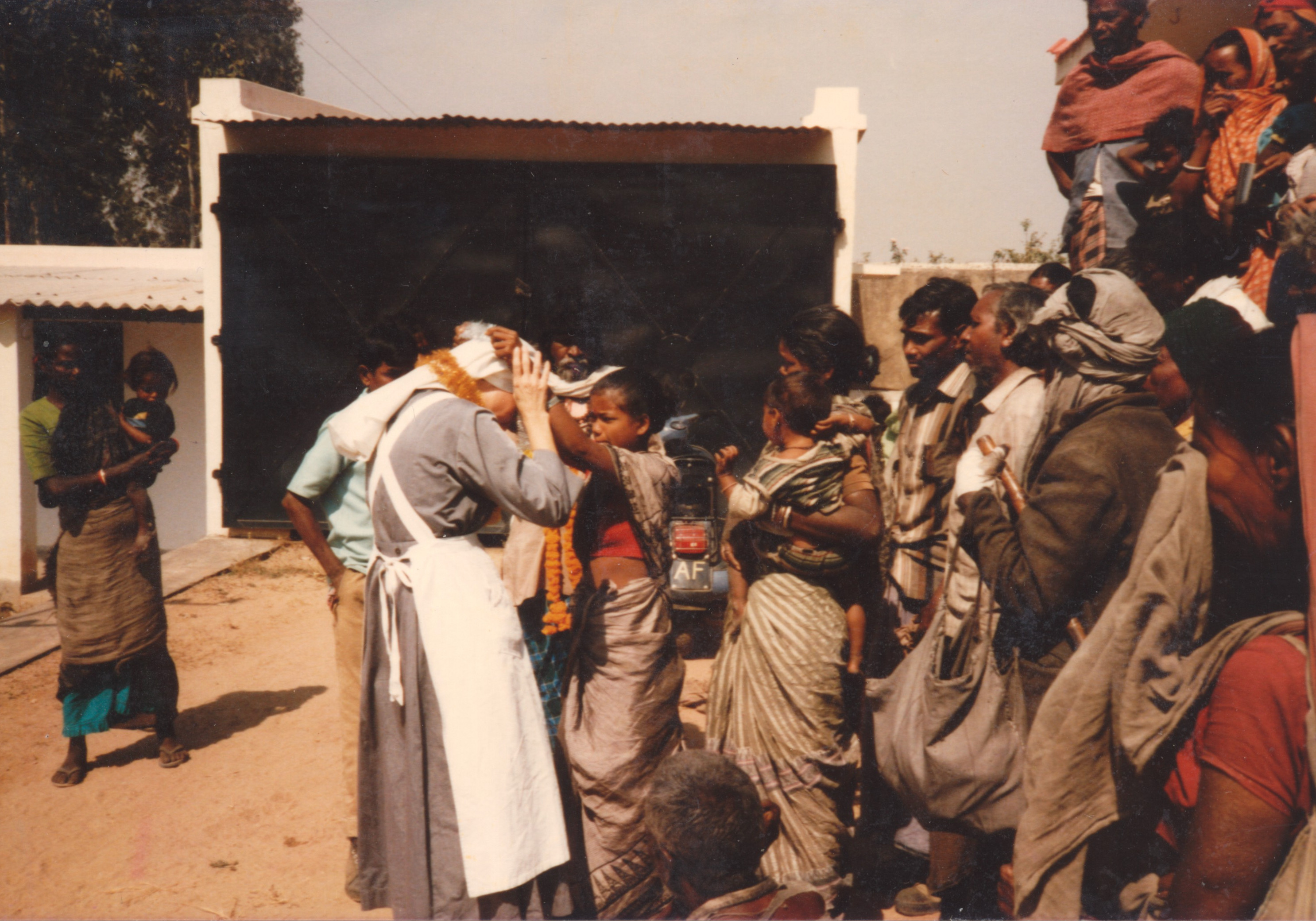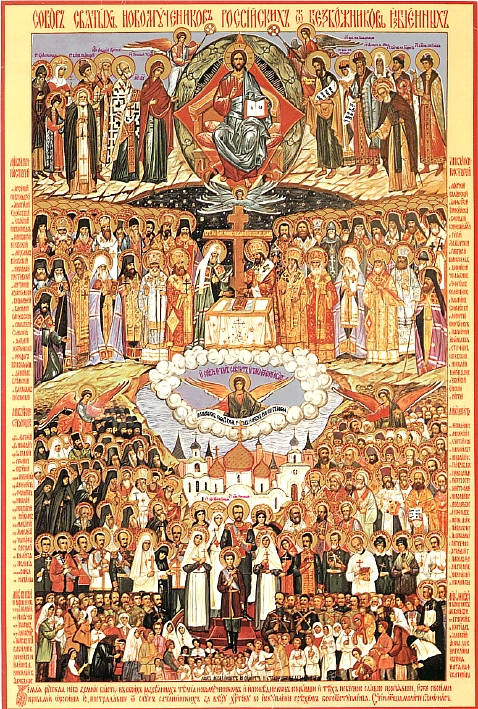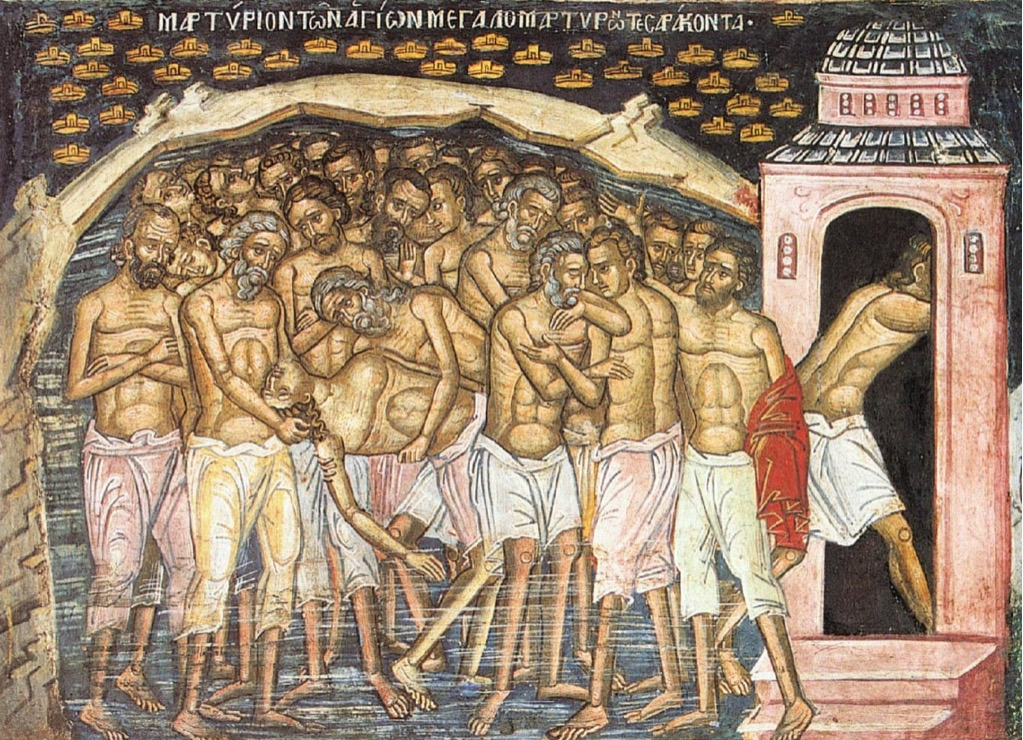
Luke 24:1-12 (Matins)
Ephesians 6:10-17
Luke 21:12-19
The Faithful
"You will be betrayed even by parents and brothers, relatives and friends;
and they will put some of you to death. And you will be hated by all for
My Name's sake. But not a hair of your head shall be lost. By your patience
possess your souls."
(Lu 21:16-19)
In the Name of the Father and of the Son and of the Holy Ghost. Amen.
We are living through the Great Age of Christian martyrdom.
This sentence no longer shocks as it once did.
Even though precise data is hard to come by,
the truth of the general message has become manifest all over the world.
The rigorous,
systematic,
and
technological
study of Christian martyrdom
is a recent development
with
the work of statistician David B. Barrett (1986).
Barrett's formula is this:
"Believers in Christ who have lost their lives prematurely, in situations of witness, as a result of human hostility."
He refines this as follows:
-
Christians are people who believe Jesus Christ to be the Son of God and who
follow Him, striving to conform their lives to His teachings.
Barrett
includes
Roman Catholics,
Orthodox,
Protestants,
Anglicans,
and
Independents (e.g., Evangelicals).
In 2010, Christians totaled 2.2 billion globally.
-
Christian witness is defined as someone who publicly lives out their Christian identity despite
the danger of doing so.
This need not include preaching or proselytizing.
No doubt, some will object to his definition.
But all debate ceases
when we consider that the Christian martyr
undergoes
a baptism of desire and blood.
The Fathers are in agreement.
St. Cyprian of Carthage wrote in 256 that all Christian martyrs
who have not yet been baptized
receive Orthodox baptism "with the most glorious and greatest baptism of blood."
A century later
St. Cyril of Jerusalem concurred writing,
"If any many man receive not Baptism,
he hath not salvation;
except only
martyrs who even without the water receive the Kingdom."
Barrett estimates that 70 million Christian martyrs have died
since the first Martyr,
the Son of God,
ascended a Cross.
A group of independents headquartered at Gordon-Conwell Seminary in Massachusetts asserts that 100,000
Christians are martyred every year,
numbers which the Vatican has also published in agreement.
A BBC reporter,
launched
a critique at this estimate
complaining
that this number includes people who were simply at the wrong place at the wrong time,
not necessarily killed because they were Christian.
Examples he adduced were Christians living in the DR Congo during the First Congo War
or
in the spill-over regions of Sudan and Uganda.
I offer a humble reply
—
that living in a zone hazardous to Christians
yet
continuing to practice Christian religion is a powerful witness to the faith.
For example,
did men don the kaffyeh?
Did woman wear burkas?
No.
They simply went about their lives as Christians.
Replying for the Vatican,
John L. Allen reminds us
that getting the numbers right
is far less important than making the general point:
Christians are indisputably persecuted the world over.
I add (once more) that this is the Great Age of Christian Martyrdom.
Here are a few data points:
-
214 churches and church properties are destroyed every month globally.
-
In northeastern Nigeria alone 900 churches were destroyed by a Muslim paramilitary group in 2017.
-
By 2013, more than 450,000 Syrian Christians were forced to flee their homes.
-
An estimated 700,000 Christians were killed in North Korea between 1948 and 1987.
-
Approximately 3,000 Christians were killed in China between 2000 and 2007.
-
10,000 Burmese Christians were killed by the military government of Myanmar by 2000.
By contrast,
the highest estimates of Christians murdered during the so-called
Great Persecution of Diocletian
are between 3,000 and 3,500.
Local persecutions under the Emperor Nero and others would have been numbered in the hundreds.

Pakistan and India persecute Christians as a matter of course.
This past week the Rt. Revd. Jos. D'Souza,
a bishop
whose diocese is in Goa along the Malabar Coast,
described "an open season for attacks against Christians"
(New York Times, Dec 22, 2021).
He recounted violent intrusions while religious services were in progress
with the faithful being physically attacked
and
books dragged outside to be burned in the streets.
"These are not isolated events,"
Bp. D'Souza
said,
but coordinated across the country.
300 have been recorded so far this year.
A Sister of this Hermitage was deported from India during the 1980s for her faith.
Was she proselytizing?
Was she preaching in public?
Was she handing out leaflets in the marketplace?
No.
She did none of these things.
She simply led a serene life of service
living among lepers,
taking care of those whom no one would care for,
loving those whom no one loved.
One of my most cherished snapshots depicts her embracing these people
taking no care to protect herself.
I saw her do the same thing in Haiti when cholera broke out
embracing people as they were "exploding out of both ends"
with no mask and no gloves.
The point is this.
A Franciscan nun, following the advice of her Founder Father, St. Francis
—
"Proclaim the Gospel everywhere. And if you must, use words."
—
is a dangerous person,
far more dangerous than the words on a throw-away leaflet.
And the Indian government could feel the heat,
could feel the power
of a silent, smiling, mere slip of a girl
with flowers about her neck and love in her heart.
And they got rid of her before others began loving the God that she loved.
You see how simple this is?
She met people who must bear a cross,
and
she made sure they did not bear it alone.
(Yes, she I know she cringes when I speak about her.
But this is life at a hermitage:
we have to bear with each other.)

That the Great Age of Christian martyrs should be unfolding all around us
is not late-breaking news to citizens of the spiritual geography called Holy Rus'.
While precise figures are understandably hard to determine,
estimates for the total number of Christians exterminated by the Soviet government
is upwards of 20 million
with
a minimum level set at 12 million.
This upper estimate is more than three times
the number of victims murdered by Nazis in their death camps.
The lowest agreed-upon estimate is double the Holocaust of the Jews and others at the hands of the Nazis.
I add as a footnote:
when you begin to research the holocausts or genocides or history,
this one is never listed.
As I say,
the witness of the true and the faithful is dangerous.
The Bolshevik government began their program of extermination
immediately.
During the first five years of their regime,
they murdered
twenty-eight bishops and sent 1,200 priests to the infamous
Gulag Archipelago.
At least 106,300 Russian Orthodox clergy were slaughtered from 1937 to 1941.
By order of Joseph Stalin,
one of the world's largest and most beautiful cathedrals,
the Cathedral of Christ the Saviour in Moscow,
was razed to the ground on December 5, 1931.
We are right to be dumbfounded by such extremes.
20 million people murdered and the attempted annihilation of an ancient religious lifeworld
stretching over twelve time zones.
Astonishing.
Surely,
this enormity
carried out in our own time
must rank among the most heinous crimes in human history.
With this great horror in mind,
we proceed to the heart of the persecutor,
which is a heart of fear.
Why are Christians
—
so meek,
so passive,
so loving
—
persecuted?
They are hated because they embody the truth about God.
Truth, you see, is unsettling.
Its power unsettles and topples civilizations.
Consider the martyrs whose Heavenly birthdays we celebrate this morning.
St. Eustratios was the noble-born Roman governor of the city state of Satalios.
He said his Christian prayers in private.
He lived his Christian life discreetly.
He fasted out of the sight of his Roman colleagues.
But he was becoming unsettled.
The Emperor Diocletian (284-305) had begun his persecution.
Slowly,
Christians began appearing all around him,
—
Christians
being
tortured,
imprisoned,
and
subjected to most cruel deaths.
He watched as they evinced a noble, unprotesting steadfastness.
In 284, a priest of the Arabian Church, St. Auxentius,
came into his line of vision.
God would use this man to unsettle Eustratios to the sticking point.
Knowing precisely what would happen to him,
Governor Eustratios public confessed His Christian faith.
Immediately,
he was arrested,
beaten,
and subjected to extreme torture.
His former troops put iron sandals on his feet and heated them until they were scarlet.
Then, they burned him alive.
Witnessing this, another "secret" Christian, St. Mardarias, confessed his faith, too,
for which he was tortured and killed.
And then another came forward, St. Eugenios, who could have remained silent.
His torturers cut out his tongue,
then cut off his hands and feet,
and,
finally,
his head.
A young soldier, St. Orestes, witnessing so many noble and faithful deaths,
stood up to confess his faith as well,
claiming the martyr's crown,
being laid upon a red-hot bed of iron.
All of these things happened at Sebaste.
The Lord Jesus said
|
"I came to send fire on the earth, and how I wish it were already kindled!"
(Lu 12:49)
|
And then He commanded every one of us, then and now,
"Take up your cross."
☦
We take it for granted
as we share these reflections from an Orthodox Christian hermitage
that all of our readers are persecuted
—
whether fearing for their lives
in the most extreme cases
or
being
marginalized and shunned and turned away from worldly preferment
on account of their rejection of the world.
Who else would read or listen to us?
In that sense we humbly offer encouragement.
You know,
martyrdom is not something that happens along the way ....
the price you pay for offending the world.
That is not it.
Christianity is fundamentally about martyrdom.
Martyrdom is its foundation and essence.
The Lord Himself said,
"...they will lay their hands on you and persecute you, delivering you
up .... You will be brought before .... rulers for My Name's sake."
(Lu 21:12)
|
I suppose at one time I considered these words to be addressed not to me,
but to the Great Age of Martyrdom ....
until I grew up and realized,
"Wait. That's now."
The birth of Jesus was heralded throughout the historical Northern Kingdom of Israel
with blood,
and not just any blood,
but the most heinous shedding of tender innocents
with Herod's
slaughter of all male babies.
The earthly end of God-with-us
reached a climax in
public torture and bloody execution.
All of the Apostles were martyred, save one.
And Christian vocation ever after has been conformed to the Cross,
which the Master has made a condition of discipleship (Mk 8:34).
The prayer we teach our children to say each night is fundamentally apocalyptic:
|
Thy Kingdom come. Thy will be done on earth as it is in Heaven.
|
To invoke God's Kingdom on earth
is the definition of apocalypse.
Two generations ago,
fighting a war,
our grandfather's said,
"We will bomb them unto 'Kingdom Come'!"
They understood the meaning of this phrase.
Read the Book of Revelation to see how history ends:
at a time of God's choosing
His inevitable Kingdom descends upon a twisted world,
hopelessly out of joint with God's mind and ways.
The least gifted observer of the world scene
can tell you that God's ways on earth
always meet with general rebellion.
Even the Commander of the Heavenly Hosts can tell you,
God's will was the cause for (perhaps) one-third of Heaven emptying.
Jesus said, "I saw Satan fall like lightning from Heaven"
(Lu 10:18).
And what is this Divine will
that has so unsettled Heaven and earth?
What exactly are these ways that
have been found
to be repugnant?
God's will is that we be true
—
to our wives or husbands,
to our parents and children.
His will is that we be pure of the world's toxins and pollution.
His will is that we be fair, not stealing from others or angling to take advantage.
His will is that we be merciful, not living out our lives in a never-ending contest against everyone else.
Finally,
His will is that we be with Him forever in the Home, which He made for us.
In sum,
His will is that we cherish in our hearts the same self-sacrificing love,
which He keeps so faithfully in His.
And what exactly is this heart?
It is not so different from the heart of any mother or father.
Does this mean that being rebellious is little more than the insolence of a teenager?
That we break the rules of decency out of a disordered ego?
Well, isn't that what happened in Eden?
In general, people don't want God.
They want to be "happy,"
which is a euphemism for indulging our appetites.
We want to be "just as we are" .... as if being ruled by impulse and desire
could ever be our true selves or could lead to lasting happiness.
Ironically,
lasting happiness and peace unto our souls
is the outcome of self-sacrifice,
in that sense,
pain.
C. S. Lewis
pictured God as a sculptor creating in each us yet another masterpiece:
Pain is God's megaphone to rouse a deaf world. You see, we are like blocks
of stone out of which the Sculptor carves the forms of men. The blows of his
chisel, which hurt us so much are what make us perfect.
|
Or as the Orthodox monk,
St. Amphilochios of Patmos,
said
You should be joyful Jesus holds a sculptor's chisel in His hands.
He wants to make you into a state for the Heavenly palace.
|
Remember the Lord Jesus when he said that our sufferings
are not for our benefit only,
but that we might be light and salt to a dark world that has lost its savor:
But it [sacrifice] will turn out for you as an occasion for testimony. Therefore settle
it in your hearts not to meditate beforehand on what you will answer; for I will give you
a mouth and wisdom which all your adversaries will not be able to contradict or resist.
(Lu 21:13-15)
|
Our sufferings will be an occasion for rousing an indifferent world out its deafness.
On a humble scale,
when this Hermitage was attacked
and
our lemon grove hacked to the ground,
and
I went up the marketplace to ask everyone I saw,
what sort of man pushes over elderly ladies who labor all day in the sun,
stealing from them what few pennies they earn,
that day was not forgotten.
It was an occasion.

And death?
Are we to fear death?
The Christian martyrs did not.
In some cases they ran toward it and embraced it.
Thirty-six years after Eustratios and his companions died,
in the very same place, Sebaste,
thirty-nine Christians
were rounded up,
stripped of their clothing,
and
forced to lay on a frozen lake to die of exposure.
That night, a Roman soldier on guard beheld a brilliant, luminescence enveloping all of the people,
beholding its Heavenly power with his own eyes.
He immediately stripped off his clothes
and ran to the lake to lay amongst them, declaring himself to be a Christian.
Warm baths had been prepared to one side of the lake hoping to lure martyrs away from their faith.
Of the thirty-nine, one defected.
In response, the next guard took his place on the lake.
That night
thirty-nine martyrs departed from Sebaste to be with the Lord Jesus this day in Paradise.
The Master has never promised to take away our pain.
He has never promised we will be spared suffering.
In fact,
quite the opposite:
He promises we will suffer.
But Christianity is not a program to protect us from pain.
It is not a special membership club for supplying animal comforts.
Christianity is a special kind of fellowship and friendship.
The Master has promised to
be with us,
no matter how black our night,
no matter how long our dark valley.
Christianity is about
solidarity,
loyalty,
faithfulness.
Is this not what we would expect from family?
And
this is what we find in Father God .... perfectly, abundantly, forever.
In the Name of the Father and the Son and the Holy Spirit.
Amen.



